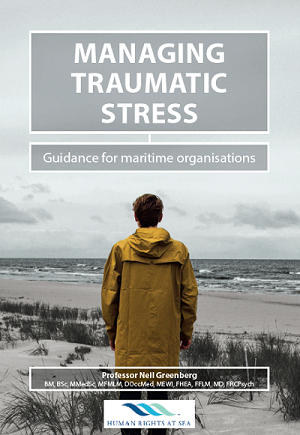New Guidance Released on Seafarer Mental Health
A new publication Managing Traumatic Stress – Guidance for Maritime Organisations aims to provide top-level guidance to senior management to help improve the mental health of seafarers. It offers education and evidence-based approaches specifically designed for the maritime industry.
The guidance is authored by Professor Neil Greenberg, Managing Director of March on Stress and Professor of Defence Mental Health at King’s College London.
 “Better mental health support for maritime not only provides moral benefits, there are also legal and financial benefits to organizations who focus on supporting their most important asset – their people,” says Greenberg.
“Better mental health support for maritime not only provides moral benefits, there are also legal and financial benefits to organizations who focus on supporting their most important asset – their people,” says Greenberg.
Published by The Nautical Institute in partnership with the charity Human Rights at Sea, the new publication explains post-traumatic stress disorder (PTSD) and provides direction about how it can be addressed within the maritime environment for crews, as well as educating commercial managers.
PTSD is an anxiety disorder caused by very stressful, frightening or distressing events. Someone with PTSD often relives the traumatic event through nightmares and flashbacks, and may experience feelings of isolation, irritability and guilt.
Greenberg, commented: “I’m delighted to have worked with Human Rights at Sea on this important publication. While only about three percent of the U.K. population are likely to suffer from PTSD, personnel working in high-risk or trauma exposed organizations experience much higher rates of PTSD. There is however very good evidence that the risk of developing PTSD or other mental health conditions can be substantially diminished if organizations put in place evidence based measures that can prevent and detect issues at an early stage.”
Bridget Hogan, Director of Publishing and Marketing at The Nautical Institute, commented: “It is hoped that this guide will lead to more open discussion, both within companies and within the industry, about mental health at sea, ending some of the stigma that attaches to the subject. It provides practical guidance for ship managers, ship operators, human resources departments and all involved with the welfare of seafarers around the world.”
The publication is available here.
